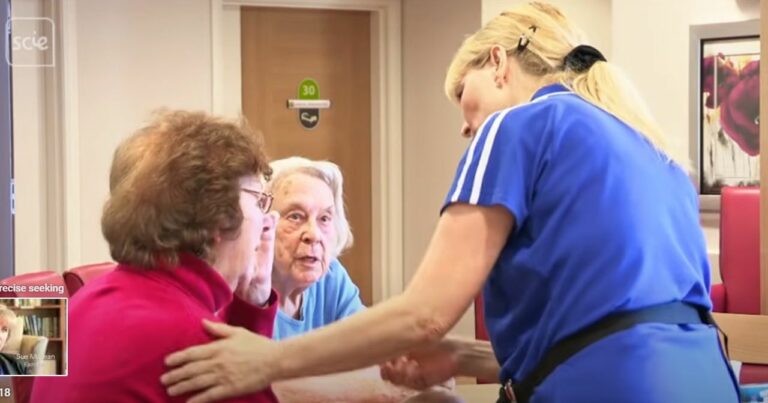Donepezil tablets are the most popular medication in the world to treat Alzheimer’s and other dementias. Donepezil is also marketed under the brand names Aricept® and Ebixa®.
Adlarity® is a new donepezil transdermal system, which means that it delivers donepezil via a skin patch, instead of swallowing a pill.
Adlarity is made by Corium, Inc. It is in a class of Alzheimer’s drugs known as acetylcholinesterase inhibitors.
7 Benefits
Adlarity has many advantages over conventional donepezil tablets, including:
- EASE OF USE: An Adlarity patch is applied once a week. Tablets need to be taken every day.
- LOWER RATE OF ADVERSE GASTROINTESTINAL PROBLEMS: Oral donepezil goes through an individual’s digestive system, which can lead to GI adverse effects (AEs), such as constipation or diarrhea. Adlarity patch delivers 7 days of a consistent dose of donepezil through an individual’s skin, so it bypasses the digestive system and results in a low possibility of GI AEs.
- DECREASE IN ERRORS: People with Alzheimer’s are prone to medication errors, such as missing a dose or forgetting that they already took their medicine and then taking it again. Adlarity patch makes this kind of mistake extremely unlikely.
- FEWER SIDE-EFFECTS: ADLARITY patches cause none-to-minimal skin irritation in most subjects.
- LESS HASSLE: With pills, patients and/or caregivers are responsible for treatment every day. With Adlarity, apply the patch once a week and medicine is delivered consistently throughout the week.
- CONSISTENT DOSE: Oral donepezil is absorbed through a patient’s digestive system, a route associated with fluctuations in the concentration of drug in circulation. ADLARITY delivers seven days of a consistent dose of donepezil through a patient’s skin, maintaining the level of medicine needed for effective treatment.
- SMOOTHER ADMINISTRATION: If swallowing or remembering are problems, Adlarity patch is a great solution
How Adlarity Works
ADLARITY is the first and only once-weekly patch to continuously deliver consistent doses of donepezil through the skin.
Adlarity’s transdermal delivery of donepezil directly into a patient’s skin bypasses the digestive system, resulting in a low possibility of GI side effects and making it easier for patients living with Alzheimer’s disease and their caregivers to administer the treatment reliably.
“The availability of a once-weekly patch formulation of donepezil has the potential to substantially benefit patients, caregivers, and healthcare providers. It offers effective, well-tolerated and stable dosing for seven days for patients who cannot take daily oral donepezil reliably because of impaired memory. It can also offer benefits for those patients who have diminished ability to swallow or have GI side effects associated with ingestion of oral donepezil,” said Pierre N. Tariot, MD, director of the Banner Alzheimer’s Institute in Phoenix, Ariz.
What the Experts Say
“I am thrilled to hear there is a new medication for people living with Alzheimer’s disease, which uses an existing therapy with an innovative new twist. This easy-to-use skin patch offers bonuses of only needing to be administered once-weekly, which in turn reduces care partners’ responsibilities too. This definitely is a step forward in the right direction,” said Lori La Bey, Care Partner to her mother who lived with dementia for 30 years, Founder of Alzheimer’s Speaks, and Co-founder of Dementia Map.
Weeklong Donepezil Delivery
Corium has deep expertise in transdermal technology and an industry-leading track record of developing and manufacturing transdermal products. ADLARITY’s approval represents an important milestone for Corium’s proprietary and proven CORPLEX transdermal technology. CORPLEX was developed with the goal of optimizing clinical benefits for patients by delivering continuous, controlled, and sustained release of a drug over a defined time.
“The FDA approval of ADLARITY brings to market a new and innovative way to deliver consistently a well-tolerated form of donepezil, the most widely used medicine for patients with Alzheimer’s disease,” said Perry J. Sternberg, President and CEO of Corium. “The approval of ADLARITY reinforces the value of Corium’s innovative CORPLEX technology, our CNS expertise, and our mission to deliver solutions that transform care for the Alzheimer’s community and others impacted by CNS diseases. We feel truly privileged to have the opportunity to potentially help millions of people in the U.S. living with Alzheimer’s disease, their loved ones, and their caregivers with a new option that can address some of the current challenges in treatment and care.”
5 mg/day or 10 mg/day
The FDA approved the once-weekly use of ADLARITY in 5 mg/day or 10 mg/day formulations. Patients may be switched from 5 mg/day or 10 mg/day oral donepezil directly to the once-weekly ADLARITY by their prescriber. ADLARITY is conveniently placed by a patient or caregiver on a patient’s back, thigh, or buttocks.
Little or No Skin Irritation
A separate trial was conducted to test for skin irritability from the Adlarity patch. In the double-blind Phase 1 study (NCT03397862), 256 healthy adults received ADLARITY on one side of their back and a placebo patch on the other side. For three weeks, the investigators placed the patches once weekly on the same location—a condition in the study exaggerating real world use by placing the patches in the same place for three weeks successively. In contrast, during routine patient use, ADLARITY’s instructions for use advise patients not to place the patch in the same location for at least two weeks (14 days) after removal from that location. After three weeks, the tested ADLARITY patches caused none-to-minimal skin irritation in most subjects.
“These important data show that the once-weekly ADLARITY skin patch had good adhesion and overall mild to no skin irritation despite the exaggerated conditions used during testing,” said lead author Marwan N. Sabbagh, MD, Professor of Neurology. “The results grow our understanding of ADLARITY’s safety profile and provide additional information that should be helpful to clinicians when considering the only weekly skin patch formulation of donepezil for their Alzheimer’s patients.”
“The skin irritation results showed a trend of better skin tolerability in study participants aged 65 or greater compared to those under 65, which is clinically relevant for the indicated patient population,” said Charles Oh, MD, Chief Medical Officer of Corium. “ADLARITY is an example of the value and commitment Corium brings to developing treatment options that address unmet needs of people with neurological conditions.”
Study examines skin irritation, sensitization, and adherence
Investigators measured any skin irritation at study days eight, 15 and 22 using a combined skin irritation score (CSIS) from the Dermal Response Scale and an Other Effects Scale, as recommended by the FDA. After three weeks, the tested ADLARITY patches caused none-to-minimal skin irritation in most subjects, scoring an average 0.55 points (±0.78) of a possible maximum of 7 points using a calculation of the mean CSIS scores across the three weekly measures. The placebo patches scored 0.19 (±0.35), indicating no skin irritation.
More Information
Marwan N. Sabbagh, MD, Philip Mathew, PhD, and Alan Blau, PhD. A Randomized Double-blind Study to Assess the Skin Irritation and Sensitization Potential of a Once-weekly Donepezil Transdermal Delivery System in Healthy Volunteers. Alzheimer Disease & Associated Disorders ():10.1097/WAD.0000000000000587, September 11, 2023. | DOI: 10.1097/WAD.0000000000000578. Available at https://journals.lww.com/alzheimerjournal/fulltext/9900/a_randomized_double_blind_study_to_assess_the_skin.73.aspx











